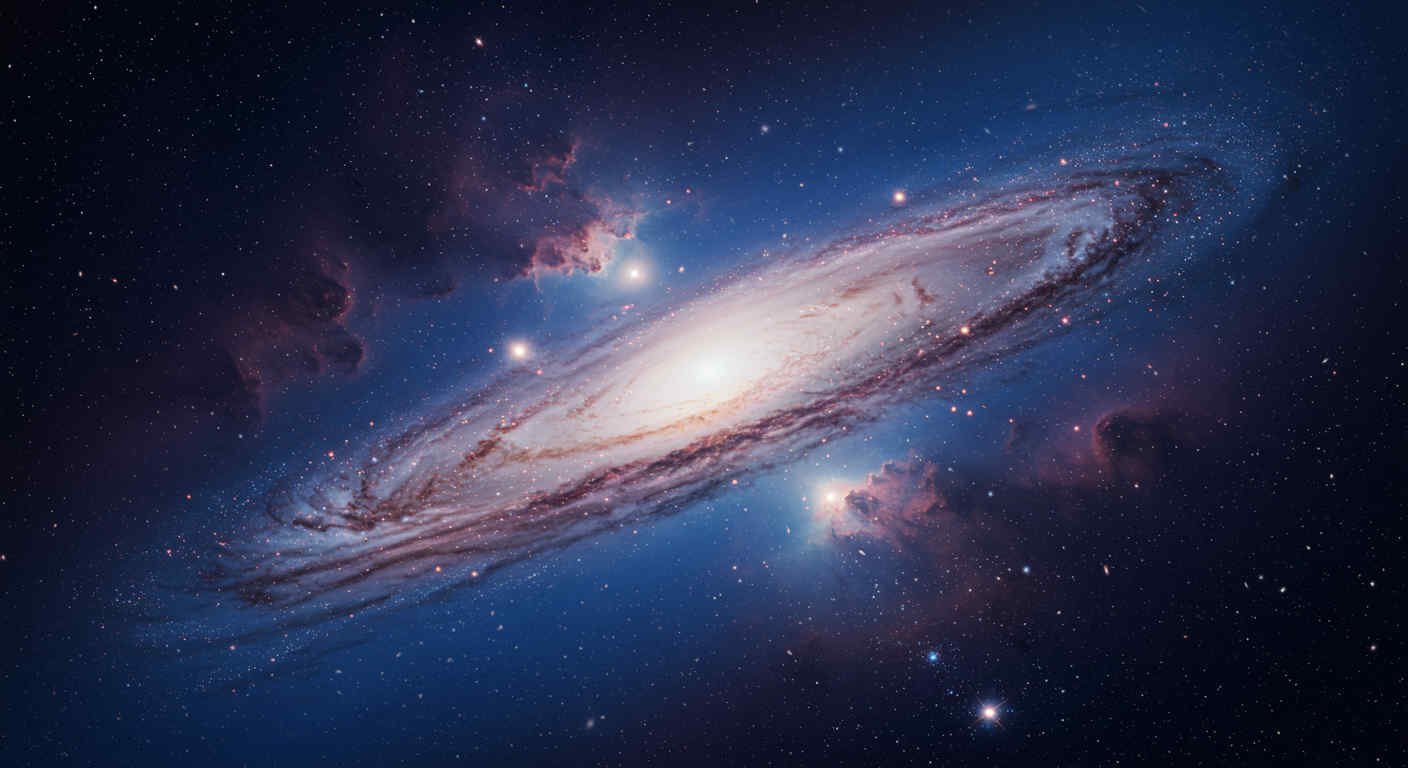Isaac Newton and the Gravity Groove: How a Falling Apple Rocked the World

Table of Contents
Newton cracked gravity’s code with a falling apple—or so the story goes! Dive into his wild ride, from the garden to the stars, and how it still shakes our world in 2025.
Kicking Off: An Apple Drops and the World Flips
Holy smokes, folks, picture this: it’s way back in 1666, and nobody’s got a clue why they’re stuck to the ground instead of floating off like a balloon. Things fall—duh—but why? Is it just ‘cause they’re heavy? Nah, that didn’t sit right with one brainy dude named Isaac Newton. This guy wasn’t about to let a mystery hang around like a bad smell—he needed answers, pronto.
Legend says Newton’s chilling in his garden, soaking up some peace, when—thud!—an apple plops to the dirt right in front of him. Boom, lightbulb moment! He’s squinting at that fruit, gears turning, wondering why it didn’t zip sideways or shoot up like a rocket. That little tumble sparked a fire in his noggin, leading him to crack one of the universe’s biggest secrets: gravity. We’re diving deep into this wild tale—apple and all—and how it flipped science on its head. Grab a snack, ‘cause this one’s a doozy!
The Apple Story: Fact or Fancy?
Alright, let’s dish on that famous apple. Word is, Newton’s kicking back under a tree when this fruit takes a nosedive—whack!—and lands at his feet. Not on his head, mind you—that’s a tall tale cooked up later to juice up the story. He’s staring at it, scratching his chin, thinking, “Why’s this sucker always falling straight down?” Then—bam!—he’s hit with a wild idea: maybe the same force yanking the apple’s also tugging the Moon around Earth like a yo-yo on a string.
This yarn comes from William Stukeley, Newton’s buddy and biographer, who scribbled it down in 1752 after a chat with the man himself. Newton, old and gray by then, spun the tale like a fireside grandpa, but here’s the kicker—there’s no hard proof that apple was the moment. Historians reckon it’s more like a shiny bow on a messy package, a neat way to wrap up how Newton’s brain ticked. Still, it’s got that fairy-tale glow, a seed that grew into a science giant. Truth or not, it’s stuck like glue!
*[New Content Start] Oh man, imagine Newton just lounging there, maybe sipping some old-timey tea—y’know, the kind that tastes like dirt and dreams. That apple’s fallin’ like a clumsy acrobat, and he’s not just seeing fruit—he’s seeing the whole dang universe winking at him. Folks back then thought the world was flat-out nuts, with stuff dropping ‘cause God said so or some airy-fairy nonsense. But Newton? He’s like, “Nah, there’s a rulebook here, and I’m gonna crack it open!”
Picture the village buzz—neighbors probably thought he’d lost his marbles, staring at apples like they’re spilling secrets. “Isaac’s gone cuckoo,” they’d whisper, shaking heads like wind chimes in a storm. Little did they know, that quiet guy in the garden was about to rewrite the playbook, turning a snack into a science superstar. It’s wild—something so small, so everyday, kicking off a brainstorm bigger than a barn! [New Content End]*
Newton’s Big “Aha!”: Gravity’s Got Grip
So, that apple’s got Newton’s wheels spinning faster than a hamster on caffeine. He’s pondering, “If it pulls this fruit down, could it stretch all the way to the Moon?” Picture him squinting at the sky, gears grinding, piecing it together like a cosmic puzzle. That’s when he cooks up the Law of Universal Gravitation—fancy name, simple gist: everything with mass is pulling on everything else, like kids tugging a rope in tug-of-war. The bigger the stuff, the harder it yanks; the farther apart, the weaker the pull—squared, to be exact.
It’s like he’s cracked a secret code whispering through the universe, a force tying apples to Moons to planets in one big dance. By 1679, he’s back at it, scribbling notes and swapping letters with bigwigs like Robert Hook from the Royal Society. Hook’s poking him for ideas, and Newton’s like, “Hold my beer—I’ve got something brewing.” That apple wasn’t just a snack—it was the spark that lit a fire under his butt!
*[New Content Start] Now, let’s zoom in on Newton’s noggin—guy’s a thinker, but he ain’t no slouch. He’s hunched over his desk, ink smudging like a kid’s finger painting, dreaming up this gravity gig. Imagine him muttering, “Okay, if this apple’s got a leash, what’s holding the Moon from zooming off like a runaway kite?” He’s scribbling numbers faster than a squirrel burying nuts, connecting dots nobody else saw.
Back then, folks figured the heavens were some fancy chandelier—planets dangling pretty with no rhyme or reason. Newton’s like, “Nope, there’s a tug-o-war up there!” He’s picturing Earth and Moon locked in a cosmic hug, pulling each other like dance partners who won’t let go. It’s a quiet eureka, no trumpets blaring—just a guy, a quill, and a hunch that’d make the stars jealous. [New Content End]*
Hook, Halley, and a Comet: The Gang Gets Going

Fast forward a bit—Newton’s not flying solo anymore. He’s trading letters with Hook, who’s all “Gimme something for the Society, dude!” Hook’s a sharp cookie, sniffing around gravity too, but Newton’s the one who nails it. Then there’s Edmund Halley—yep, comet guy—who’s like, “Yo, Isaac, spill the beans!” Around 1680-81, a comet streaks across the winter sky, twinkling like a cosmic firecracker, and Newton’s hooked. He’s chatting up John Flamsteed, the stargazing pro, grabbing data like a kid snagging candy.
Hook’s pushing him to explain why planets loop in funky ovals—thanks, Kepler!—and Newton’s lightbulb’s blazing. He figures it’s a force fading with distance squared, tugging everything toward the center like a magnet on a leash. By December 1684, he’s got a rough draft—De Motu Corporum—and Halley’s so pumped he foots the bill to publish the big kahuna: Philosophiæ Naturalis Principia Mathematica, or just Principia for short. Drops July 5, 1687, and bam—science’s never the same!
*[New Content Start] Oh boy, picture the scene—Hook’s letters piling up like junk mail, nagging Newton like a pesky fly. “C’mon, Isaac, cough up some genius!” he’s hollering, and Newton’s probably rolling his eyes, thinking, “This guy’s a thorn in my side.” But that nudge? It’s the kick he needs. Then Halley swoops in, all starry-eyed, practically begging for a peek at Newton’s brain stash.
That comet’s the cherry on top—blazing across the sky like a cosmic graffiti tag, screaming, “Look at me!” Newton’s out there, telescope glued to his face, jaw dropping as it zips by. He’s scribbling to Flamsteed, “Hey, man, gimme the dirt on those orbits!”—like a detective hot on a trail. It’s a science posse rounding up clues, and Newton’s the sheriff roping ‘em into one big, beautiful knot. [New Content End]*
Principia Unleashed: Laws That Rock the Boat
Oh man, Principia’s a beast—three laws of motion that hit like a sledgehammer. First: stuff sits still or keeps rolling unless something shoves it—think a hockey puck gliding ‘til it’s whacked. Second: force equals mass times acceleration, like how hard you gotta push a shopping cart full of groceries. Third: every shove gets a shove back—punch a wall, it punches your knuckles. Simple, right? But these babies laid the tracks for the Industrial Revolution’s steam-and-steel train.
Then there’s gravity—Newton calls it “gravitas,” Latin for weight, and it’s the glue holding the cosmos together. He’s calculating orbits, flattening Earth into a squashed ball, even figuring how the Moon’s yank messes with tides. It’s like he’s handed us a map to the universe, drawn with math sharper than a tack. Folks back then were gobsmacked—this invisible pull was wilder than a ghost story!
Standing on Giants: Newton’s Backup Crew
Newton’s no lone wolf—he’s got a posse of brainiacs propping him up. He tips his hat to Galileo Galilei and Johannes Kepler, saying he’s “standing on the shoulders of giants.” Galileo’s the Italian hotshot who chucked stuff off the Leaning Tower of Pisa—two balls, different weights, hitting the dirt at the same time. Zap—Aristotle’s “heavier falls faster” idea’s toast! Galileo’s like, “Nah, it’s all the same speed unless air’s in the way,” setting the stage for Newton’s big swing.
Kepler’s the German stargazer mapping planets in loopy ellipses, not circles—crazy stuff Tycho Brahe tracked with eagle eyes. Newton grabs their goodies, stirs ‘em into his pot, and cooks up a theory tastier than grandma’s stew. Hook, Wren, Halley—they’re tossing logs on the fire too. It’s a science jam session, and Newton’s strumming the lead guitar!
*[New Content Start] Let’s give Kepler some love—he’s out there with his nose in the stars, plotting orbits like a kid doodling mazes. Tycho’s his wingman, eyeballing the sky ‘til his eyes bug out, handing Kepler a treasure chest of numbers. Newton’s like, “Sweet, I’ll take that!”—swiping their work like a chef nabbing spices.
Hook’s a wildcard, though—guy’s got brains but a temper hotter than a jalapeño. He’s yapping at Newton, “I thought of that first!”—like a rooster crowing at dawn. Newton’s cool as a cucumber, brushing him off, but you can bet Hook’s huffing lit a spark. It’s a crew of oddballs, each tossing a pebble into the pond, and Newton’s the one making waves big enough to surf! [New Content End]*
Galileo’s Warm-Up Act: Ramps and Pendants
Let’s rewind to Galileo—he’s the opening act rocking the stage. Picture him in Pisa’s cathedral, zoned out during Mass, eyeballing a chandelier swaying like a lazy dancer. He’s counting beats—tick, tock—and noticing each swing’s the same time, even as it slows. Back home, he’s tying rocks to strings, swinging ‘em like a kid with a yo-yo, and—bam!—the pendulum’s born. Time’s steady, no matter the weight, just the string’s length.
Then he’s atop that wonky tower, dropping cannonballs and feathers—okay, maybe not feathers, but you get it. They hit the ground together, air or no air, smashing old ideas like a sledgehammer through glass. Later, he’s rolling balls down a wooden ramp—clunk, roll—timing ‘em with water dripping into a cup ‘cause clocks ain’t a thing yet. Distance doubles, time squares—acceleration’s uniform, baby! Galileo’s the spark; Newton’s the blaze.
*[New Content Start] Oh, imagine Galileo up there, wind whipping his hair like a rockstar, chucking stuff off that tower with a grin. “Take that, Aristotle!” he’s hollering, watching those balls smack the dirt like twins racing to the finish. Folks below are gawking, jaws dropping like apples—ironic, huh?—thinking, “This guy’s nuts!”
Back at his pad, he’s rigging that ramp like a DIY king, balls rolling smooth as butter, water dripping like a leaky faucet—drip, drip—counting beats ‘til his head spins. It’s low-tech genius, a scrappy fight against the old guard, and he’s laughing all the way. That chandelier? It’s swaying like a metronome, whispering secrets Galileo turns into gold—Newton’s just the guy who cashes it in big! [New Content End]*
Gravity’s Got Game: Shaping the Cosmos

Newton takes Galileo’s baton and sprints. Planets swoop in ellipses ‘cause gravity’s pulling like a cosmic puppeteer, fading with distance squared. He’s crunching numbers—Earth’s a squished sphere ‘cause gravity’s squeezing it tight, stars and Moons too. Tiny dust clumps in space? Gravity gloms ‘em into balls, yanking particles to the core like a hug that won’t quit. Irregular asteroids? Too puny to shape up.
Tides? Moon’s tugging the oceans like a kid yanking a blanket. Comets? Newton’s plotting their wild loops—circles, parabolas, hyperbolas—like a quarterback calling plays. He’s even tweaking the solar system—Sun’s not glued in place; it wobbles around a center of mass with Earth and pals, a cosmic seesaw rocking steady. It’s a universe humming to gravity’s tune, and Newton’s the maestro!
Pushback and Punchback: Gravity’s Haters

Not everyone’s clapping—some folks are throwing shade. “A force from nowhere? That’s hocus-pocus!” they grumble, shaking fists like grumpy old timers. Newton’s idea of an invisible pull zapping across space feels like a step back to magic-land. He’s unfazed—second edition of Principia in 1713, he’s like, “Chill, I don’t need to explain why it works; it just does.” The proof’s in the pudding—apples fall, planets spin, tides roll.
Aristotle’s ghost is rattling chains too—his “heavy stuff drops quick” got smashed by Galileo, but it hung on ‘til Newton’s knockout punch. The haters fade, and gravity’s strutting like a champ, undeniable as a sunrise.
Gravity Today: Still Kicking in 2025
Fast forward to now—gravity’s still the MVP. We’re clocking it at 9.8 meters per second squared, give or take, with gizmos like gravimeters jazzed up by Lucien LaCoste and Arnold Romberg in the ‘30s and ‘40s. Earth’s a lumpy potato, not a perfect ball—squashed at the poles, fatter at the equator—so gravity’s a smidge weaker where palm trees sway. Climb Everest? It dips more, ‘cause you’re farther from the core.
Mountains, oceans, even underground goodies tweak it too—geophysicists sniff out oil and quakes with those wiggles. Earth’s spinning? That centrifugal kick shaves a hair off at the equator—sorry, no weight-loss vacation! GPS geeks tweak for it, astronauts wrestle it in space—bones thinning like old twigs—and builders shore up skyscrapers with local gravity specs. It’s a quiet giant shaping our world, sneaky as a shadow.
*[New Content Start] Man, think about those astronauts up there—floating like jellyfish, bones turning brittle as stale crackers. They’re guinea pigs in a cosmic lab, showing us what gravity’s absence does—yikes! Down here, we’re sniffing out oil with gravimeters humming like busy bees, finding treasure under the dirt.
Picture a GPS guy tweaking signals, muttering, “Dang gravity, quit messing with my maps!”—it’s a dance with the planet’s quirks. And builders? They’re eyeballing blueprints, sweating bullets to keep towers standing tall—gravity’s the silent boss barking orders. It’s everywhere, sneaky as a cat, keeping us grounded and guessing! [New Content End]*
Where’d It Come From? The Big Mystery
Here’s the head-scratcher—where’s gravity from? Newton’s like, “Beats me, but it works!” Einstein swoops in 1915 with a curveball: it’s not a force, it’s space-time bending like a trampoline under a bowling ball. Stuff rolls down those curves, and we call it gravity—wild, huh? Big Bang’s the hot guess—13.8 billion years back, when everything popped, gravity split off like a kid bolting from a pack.
String theory’s tossing curveballs too—our universe a “brane” floating in a higher-dimensional soup, gravity leaking out like water through a sieve. Parallel worlds? Black holes as doors? It’s a sci-fi fever dream, and scientists are still scribbling, chasing the ghost Newton couldn’t catch. The groove’s deep, but the source? Still a whisper in the wind.
*[New Content Start] Oh boy, imagine the Big Bang—kaboom!—like a cosmic firecracker popping the universe into gear. Gravity’s peeling off like a shy kid at a party, ducking out first while the other forces huddle up. Einstein’s bending space-time’s a head-twister—planets rolling like marbles down a hill, caught in a web we can’t see.
String theory’s wilder—our world’s a sheet flapping in a storm of extra dimensions, gravity sneaking off like a thief in the night. Black holes? Maybe they’re trapdoors to other branes, sucking us in with a whoosh! Scientists are hunched over desks, pencils snapping, chasing a riddle that’s slipperier than a greased pig! [New Content End]*
Wrapping Up: Newton’s Apple Still Rolls
That apple—real or not—kicked off a ruckus that’s still rumbling in 2025. Newton turned a thud into a thunderclap, tying Earth to the stars with a force sneakier than a cat on the prowl. Galileo’s ramps, Kepler’s loops, Einstein’s bends—they’re all threads in a tapestry Newton wove, a groove we’re still dancing to.
So, next time you drop your keys—clank!—give a nod to Isaac. His garden spark lit a fire that’s guiding rockets, mapping Earth, and dreaming of cosmic branes. The apple’s long gone, but its echo’s a roar—ain’t that a trip?
See this good external article: https://education.nationalgeographic.org/resource/isaac-newton-who-he-was-why-apples-are-falling/
See this another good article in our blog: https://techforgewave.com/giants-searching-for-kardashev-civilizations/





